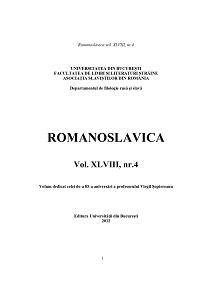Eminescu în literaturile slave
Eminescu in Slavonic literatures
Author(s): Dumitru CopiluSubject(s): Romanian Literature, 19th Century, Translation Studies, Theory of Literature, Sociology of Literature
Published by: Editura Universităţii din Bucureşti
Keywords: Mihai Eminescu; Slavonic literatures;
Summary/Abstract: The historical and geographical homeland of Mihai Eminescu was and is an island in the Slavonic world. The spiritual homeland of his literary creation has been and continues to be the liaison of approach and osmosis with the Slavonic peoples’ literatures, as it proved to be also with the literatures and cultures of more than 250 states and territories of modern world. The universalization process of Eminescu’s creation at European level had been unleashed by a glorious event in epoch, occurred during the poet’s life time, in full ascent of his creative poetic and journalistic genius. In 1881, 30 of his lyrical gems were included in „Rumänische Dictungen”, an anthological volume which appeared in some editions in Leipzig and Bonn, at the same time reproduced in other volumes and magazines, popolarized in the whole Germany, taken over and favourably commented in Italy, France, Austria, Hungary, but also in Romania, with echoes in New York, Chicago, St.Petersburg, Warsaw, Sofia. The first events of Eminescu’s reception in the Slavonic literary world occurred, naturally, in the Russian literature. Even during the poet’s life time and during the following period, the encyclopedic publications and those of the university academic milieu synthetize the data spread in the European literary world at the end and at the beginning of the new century about the European value of the Romanian poet’s work, so that one of the famous world literary science, Acad. Feodor Korsh from the Moscow University recognizes, according to the phylological exigencies, ”a special perfection in shape and a great height in reflection”, proved in 1901 by his own posthumous sonnet, ”However much stars”, by this marking the beginning of universalization process of his works value, until nowadays identified in Russia in more than 100 volumes (separate editions and anthologies) and 50 periodicals, 1596 translations and 271 critical references (volumes, studies and articles), among which substantial syntheses in 23 encyclopaedias and 8 doctor’s papers. The performances in the act of translation during the latest decades have promoted a new idea in the modern Eminescology, according to which for Eminescu’s oneness it can be created and it was created a specific poetic language, Eminescian, successful in many of the Russian translations realized during the latest decades. Even from the end of the XIXth century, in the other Slavonic literatures the presence of Eminescu has been a phenomenon which stimulated the proper native creative potential. In Bulgary the estimation to be acknowledged as ”the most representative genius of Balcanic peoples” has been proved by 30 volume and more than 30 periodicals promoting him with 224 translations and more than 40 critical references. In Poland, as a national poet of universal value he was acknowledged first in 4 encyclopaedias, proved until now with 32 volume and 40 periodicals which published 208 translations and 60 references, and in Serbia to be published in 23 volume and 20 periodicals including 238 translations, commented in 60 papers, the significance of reception beeng proved also in Ukraina with 326 translations and 66 references, in Czech Republic with 97 translations and 30 papers, in Croatia with 50 translations and 7 papers, in Slovakia, Slovenia and Byelorussia with more than 150 translations and 15 critical references. These quantitative data allow a mathematical evaluation of translations quality in Slavonic languages, as far as these are more or less near the Romanian original.
Journal: Romanoslavica
- Issue Year: XLVIII/2012
- Issue No: 4
- Page Range: 65-71
- Page Count: 7
- Language: Romanian

